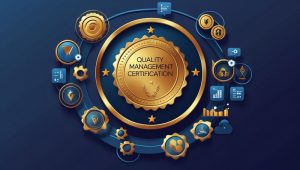The quality management certification market is undergoing a significant evolution, driven by the rapid adoption of emerging technologies. As organizations strive to enhance operational efficiency, ensure regulatory compliance, and meet global quality standards, technologies such as artificial intelligence (AI), machine learning (ML), blockchain, the Internet of Things (IoT), and cloud computing are redefining how quality management systems (QMS) are implemented, audited, and certified. This transformation is streamlining processes, reducing costs, and enabling continuous improvement—ushering in a new era of digital quality assurance.
Artificial Intelligence and Machine Learning are playing a pivotal role in revolutionizing quality management practices. These technologies allow organizations to analyze massive datasets, identify patterns, and predict potential quality failures before they occur. AI-powered tools can detect anomalies in manufacturing, automate root cause analysis, and suggest corrective actions. By enabling predictive quality assurance, AI helps organizations maintain compliance with ISO 9001 and other quality standards more proactively and efficiently.
Download PDF Brochure @ https://www.marketsandmarkets.com/pdfdownloadNew.asp?id=202845337

Blockchain technology is adding a new layer of trust and transparency to quality management certification. By creating immutable digital records, blockchain ensures that all data related to compliance, audits, and certification processes remains secure and tamper-proof. This is particularly valuable in sectors like pharmaceuticals, food safety, and aerospace, where traceability and integrity of quality records are critical. Blockchain simplifies supplier audits and third-party verifications, reducing the time and cost associated with traditional certification procedures.
IoT-enabled devices and sensors are transforming real-time quality monitoring across production lines, warehouses, and supply chains. These connected technologies continuously collect data on variables such as temperature, pressure, vibration, and humidity—ensuring that quality-critical parameters are always within defined limits. When integrated with a QMS, IoT devices provide instant alerts about deviations, facilitate swift corrective actions, and generate verifiable audit trails for certification bodies.
Cloud-based Quality Management Systems are replacing legacy paper-based processes, offering centralized access to compliance documentation, audit records, training logs, and CAPA (Corrective and Preventive Action) workflows. These platforms enable organizations to standardize and scale their quality management efforts across multiple locations while improving collaboration between internal teams, external auditors, and certification bodies. The cloud also allows for real-time updates, seamless integration with ERP systems, and enhanced data security.
Robotic Process Automation (RPA) is further streamlining the certification process by automating repetitive and time-consuming tasks such as document review, compliance reporting, and certification renewal tracking. By minimizing manual errors and accelerating administrative workflows, RPA ensures that organizations maintain readiness for audits and stay aligned with evolving quality standards.
In addition, advanced data analytics and visualization tools are empowering quality managers to gain deeper insights into quality trends, performance metrics, and non-conformance patterns. These insights support strategic decision-making, promote continuous improvement, and drive innovation in quality assurance practices.
In conclusion, emerging technologies are profoundly reshaping the quality management certification market. They are transforming traditional, reactive approaches into intelligent, predictive, and agile quality systems. As industries continue to digitize and regulatory requirements grow more complex, the integration of these technologies will be essential in achieving sustainable, efficient, and scalable quality certification.
